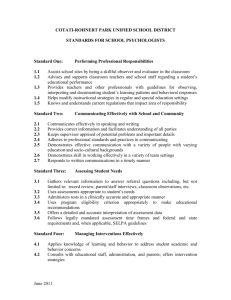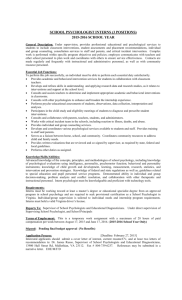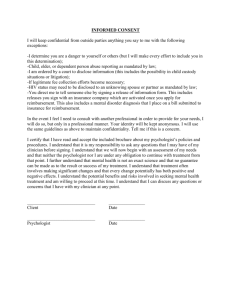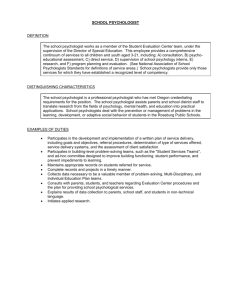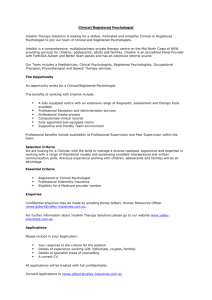Standard : Type standard here - Montgomery County Public Schools
advertisement
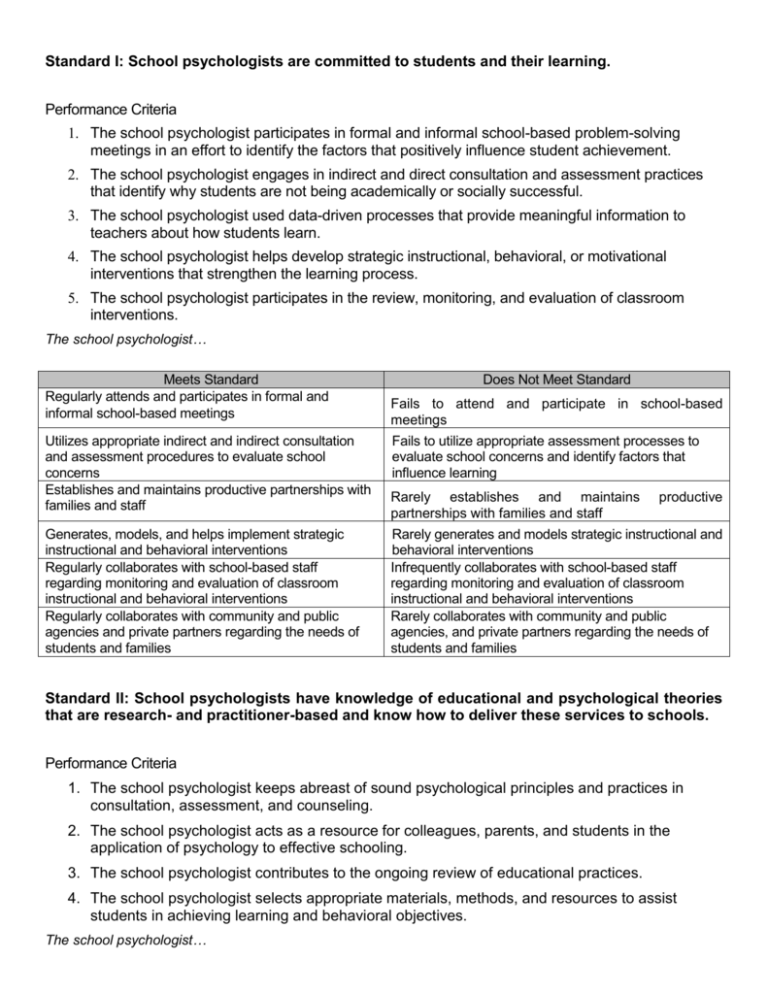
Standard I: School psychologists are committed to students and their learning. Performance Criteria 1. The school psychologist participates in formal and informal school-based problem-solving meetings in an effort to identify the factors that positively influence student achievement. 2. The school psychologist engages in indirect and direct consultation and assessment practices that identify why students are not being academically or socially successful. 3. The school psychologist used data-driven processes that provide meaningful information to teachers about how students learn. 4. The school psychologist helps develop strategic instructional, behavioral, or motivational interventions that strengthen the learning process. 5. The school psychologist participates in the review, monitoring, and evaluation of classroom interventions. The school psychologist… Meets Standard Regularly attends and participates in formal and informal school-based meetings Utilizes appropriate indirect and indirect consultation and assessment procedures to evaluate school concerns Establishes and maintains productive partnerships with families and staff Generates, models, and helps implement strategic instructional and behavioral interventions Regularly collaborates with school-based staff regarding monitoring and evaluation of classroom instructional and behavioral interventions Regularly collaborates with community and public agencies and private partners regarding the needs of students and families Does Not Meet Standard Fails to attend and participate in school-based meetings Fails to utilize appropriate assessment processes to evaluate school concerns and identify factors that influence learning Rarely establishes and maintains partnerships with families and staff productive Rarely generates and models strategic instructional and behavioral interventions Infrequently collaborates with school-based staff regarding monitoring and evaluation of classroom instructional and behavioral interventions Rarely collaborates with community and public agencies, and private partners regarding the needs of students and families Standard II: School psychologists have knowledge of educational and psychological theories that are research- and practitioner-based and know how to deliver these services to schools. Performance Criteria 1. The school psychologist keeps abreast of sound psychological principles and practices in consultation, assessment, and counseling. 2. The school psychologist acts as a resource for colleagues, parents, and students in the application of psychology to effective schooling. 3. The school psychologist contributes to the ongoing review of educational practices. 4. The school psychologist selects appropriate materials, methods, and resources to assist students in achieving learning and behavioral objectives. The school psychologist… Meets Standard Regularly attends trainings and conferences and completes course work relevant to the discipline of school psychology Demonstrates flexibility in making decisions about interventions based on a sound integration of theory, practice, and information about the student Actively volunteers and participates in work groups and on committees that contribute to the review of educational practices Conducts in-service training for school stakeholders Does Not Meet Standard Infrequent attendance at trainings and conferences. Does not complete course work relevant to the discipline of school psychology Inflexible in service delivery. Models a “one-size-fits-all approach Rarely volunteers or participates on committees or work groups Rarely conducts in-service training. Standard III: School psychologists use a decision-making process in collaboration with other team members, school staff, students’ family members, and other stakeholders, as appropriate to identify academic and behavior problems, collect and analyze information to understand the problems, make decisions about service delivery, and evaluate the outcomes of service delivery. Performance Criteria 1. The school psychologist defines problems in ways that identify desired goals (e.g., academic/social/emotional/behavioral/vocational), are measurable, and are functionally linked to assessment strategies. 2. The school psychologist uses multiple methods and/or techniques to assess student progress toward behavioral, academic, and vocational goals and assist in revising instructional strategies, as necessary. 3. The school psychologist selects assessment methods that are validated for the problem area under consideration, including formal and informal assessment procedures, as appropriate, and include data collected from all settings and procedures, as appropriate, and include data collected from all settings and persons necessary and appropriate to complete the problemsolving process. 4. The school psychologist helps develop and implement effective interventions that are based upon the data collected and related directly to the outcomes of those interventions. 5. The school psychologist establishes and maintains productive partnerships with families and staff by promoting and modeling openness and mutual respect. 6. The school psychologist integrates technology and research into planning and facilitating effective instructional and behavioral interventions. The school psychologist… Meets Standard Clearly states problems in observable and measurable terms Assessment strategies reflect and address the identified problem Uses valid and appropriate assessment methods that match the presenting problem Collects data for problem solving from sources and settings pertinent to the identified problem Develops effective interventions that are based on the data collected Uses appropriate monitoring and evaluation techniques when assessing student progress Regularly collaborates with community and public agencies, and private partners regarding the needs of students and families Uses technology and/or research in planning and facilitating instructional and behavioral interventions Does Not Meet Standard Rarely states problems in observable or measurable terms Rarely uses assessment strategies that address the identified problem Rarely uses valid and appropriate assessment methods that match the presenting problem Rarely collects data for problem solving from sources and settings pertinent to the identified problem Rarely develops effective interventions that are based on the data collected Rarely uses appropriate monitoring and evaluation techniques when assessing student progress Rarely establishes and maintains productive partnerships with families and staff Rarely uses technology and/or research in planning and facilitating instructional and behavioral interventions Standard IV: School psychologists, in collaboration with others, develop challenging but achievable cognitive, social/emotional, and academic goals for all students and provide information about ways in which students can achieve these goals. Performance Criteria 1. The school psychologist applies current empirically based theories learning to the development of effective instructional strategies that promote student achievement and positive behavioral, social, and emotional development. 2. The school psychologist incorporates assessment information into the development of instructional strategies to meet the individual learning and social/emotional needs of children. 3. The school psychologist is knowledgeable about advances in curriculum, instruction, and mental health and shares this knowledge with educators, parents, and the community at large to promote improvement in instruction, student achievement, and healthy lifestyles. 4. The school psychologist provides information in both informal and formal settings to school staff on how students develop and learn. 5. The school psychologist provides training and workshop activities to students, parents, and staff based on the practical and effective use of learning theories. The school psychologist… Meets Standard Applies empirically based theories of learning to develop effective instructional strategies Incorporates student-specific assessment information into the development of instructional strategies Shares or demonstrates knowledge about advances in curriculum, instruction, or mental health Communicates practical information to teachers and parents on student learning Provides in-service activities to students, parents and staff Does Not Meet Standard Rarely applies empirically based theories of learning to develop effective instructional strategies Rarely incorporates student-specific assessment information into the development of instructional strategies Rarely shares or demonstrates knowledge about advances in curriculum, instruction, or mental health Does not communicate practical information to teachers and parents about student development and learning Rarely provides in-service activities to students, parents and staff Standard V: School psychologist actively participate in activities designed to continue, enhance, and upgrade their professional training and skills to help ensure high-quality service provision. Performance Criteria 1. The school psychologist seeks out opportunities to enhance instructional practice through workshops, professional organizations, conferences, and graduate-level courses. 2. The school psychologist seeks the assistance of other disciplines in consultative or referral roles in providing services, as appropriate. 3. The school psychologist actively participates in school- or systemwide committees or system initiatives such as crisis management teams, peer review teams, or system reform. 4. The school psychologist mentors, coaches, and supervises the development of school psychology interns. 5. The school psychologist maintains awareness of effective psychological practices and materials and uses newly acquired knowledge and skills in professional practice. The school psychologist… Meets Standard Attends workshops, seminars, in-service trainings, conferences, and the like related to the profession of school psychology Actively participates in the local, state, or national school psychologists association Collaborates with other professionals in the field Participates actively in MCPS school-or systemwide committees or work groups Assumes responsibility for assisting in the development of interns/practicum students and/or the mentoring of psychologists new to MCPS Stays abreast of current practices by reading journals pertinent to the field of school psychology and applies innovative evidence-based strategies and practices based on the reading Participates in teaching graduate-level courses, makes workshop presentations, or submits articles for publication about issues relevant to the field of school psychology Does Not Meet Standard Rarely attends workshops, seminars, in-service trainings, conferences, and the like related to the profession of school psychology Does not participate in the local, state, or national school psychologists association Shows little or no evidence of collaboration with other professionals in the field Participates infrequently in MCPS school- or systemwide committees or work groups Does not participate in assisting in the development of interns/practicum students and/or the mentoring of psychologists new to MCPS Does not read about or apply new techniques or practices Does not participate in teaching graduate-level courses, make workshop presentations, or submit articles for publication about issues relevant to the field of school psychology Standard VI: School psychologists exhibit a high degree of professionalism. Performance Criteria 1. The school psychologist takes the leadership role on committees; helps to plan staff meetings or workshops, and shares knowledge or expertise with colleagues. 2. The school psychologist meets professional obligations in a timely manner (including all reports and data collection), participates in meetings, has infrequent absences, and is willing to serve as a facilitator/mentor to others. 3. The school psychologist conducts him-/herself in a professional manner when collaborating with colleagues, community and public agencies, and private partners on behalf of students and families. 4. The school psychologist follows federal, state, and local policies and procedures and adheres to the National Association of School Psychologists Code of Conduct. The school psychologist… Meets Standard Assumes leadership0 roles on committees, helps to plan staff meetings, and shares knowledge or expertise with colleagues Completes professional obligations in a timely manner including regular attendance and participation in meetings Completes all reports in a timely manner, using professional language only when necessary and appropriate, and monitors written material to be sure it is error free (specifically with regard to punctuation, grammar, and usage) Conducts self in a professional manner Follows federal, state, and local regulations, policies, and procedures Adheres to the National Association of School Psychologists code of conduct Does Not Meet Standard Rarely assumes leadership roles on committees, helps to plan staff meetings, or share knowledge or expertise with colleagues Rarely completes professional obligations in a timely manner, including regular attendance and participation in meetings Fails to complete reports in a timely manner. Frequently uses professional jargon, fails to monitor written material to be sure it is error free (specifically with regard to punctuation, grammar, and usage) Fails to conduct self in a professional manner Fails to follow federal, state, and local regulations, policies, and procedures Fails to adhere to the National Association of School Psychologists code of conduct


